Strategic Marketing Report: Purity Soft Drinks' Expansion in France
VerifiedAdded on 2021/01/03
|14
|4095
|159
Report
AI Summary
This report provides a strategic marketing analysis for Purity Soft Drinks Ltd., focusing on its planned expansion into the French wine market. It begins with an executive summary and an introduction outlining the company's background and objectives. The core of the report involves a PESTLE analysis to assess the political, economic, social, technological, legal, and environmental factors influencing the company's operations in France. The analysis highlights the favorable political and economic environments, the importance of wine in French culture, and the advanced technological landscape. The report then evaluates various market entry strategies, concluding that franchising is the most suitable option. Detailed market segmentation identifies the target demographic as urban, affluent consumers aged 21-80 who embrace a wine culture and have high spending habits. Finally, the report applies Porter's Generic Strategies, recommending a differentiation strategy to establish a competitive advantage in the French market. The report is a comprehensive analysis of strategic marketing principles and their practical application within a specific business context.
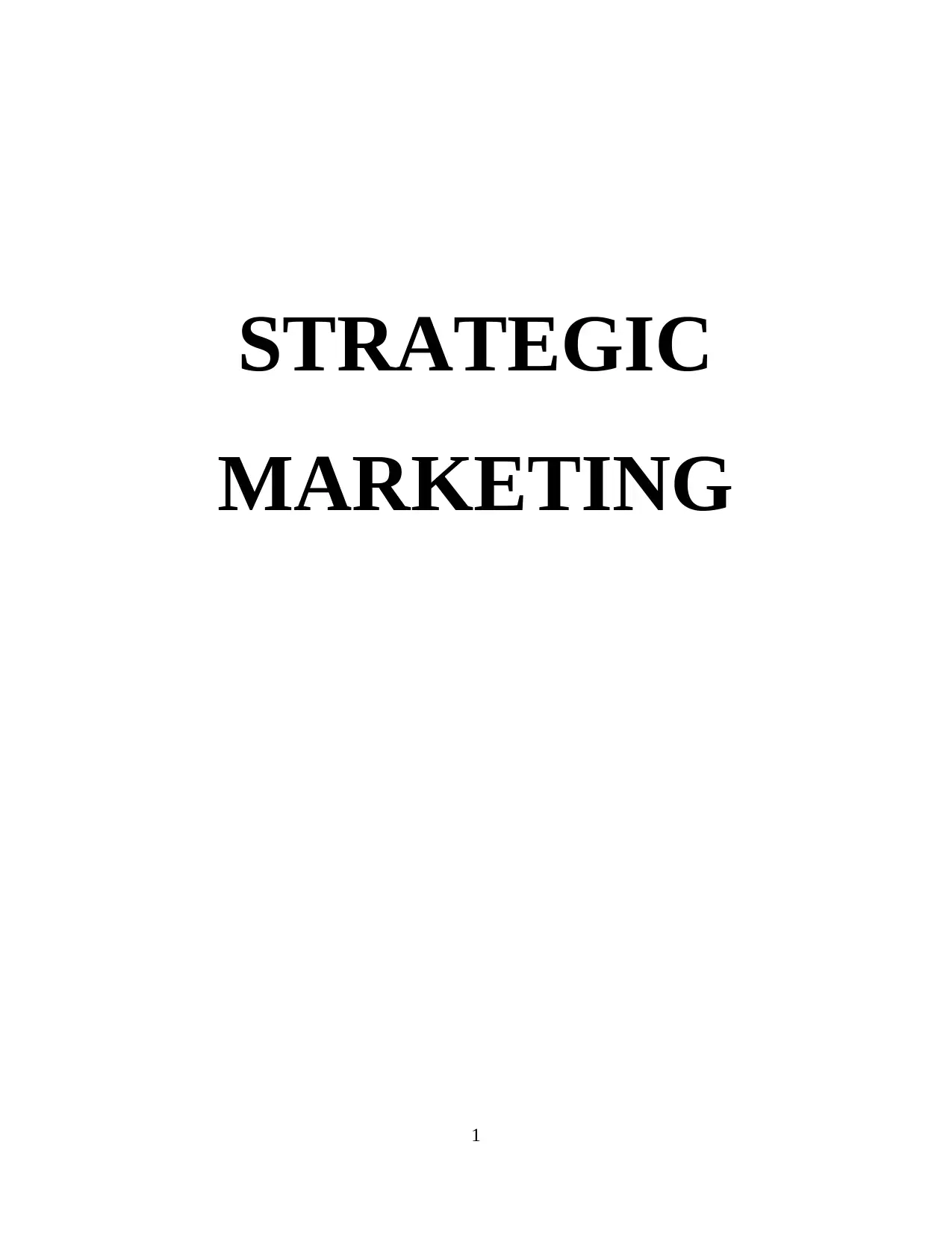
STRATEGIC
MARKETING
1
MARKETING
1
Paraphrase This Document
Need a fresh take? Get an instant paraphrase of this document with our AI Paraphraser
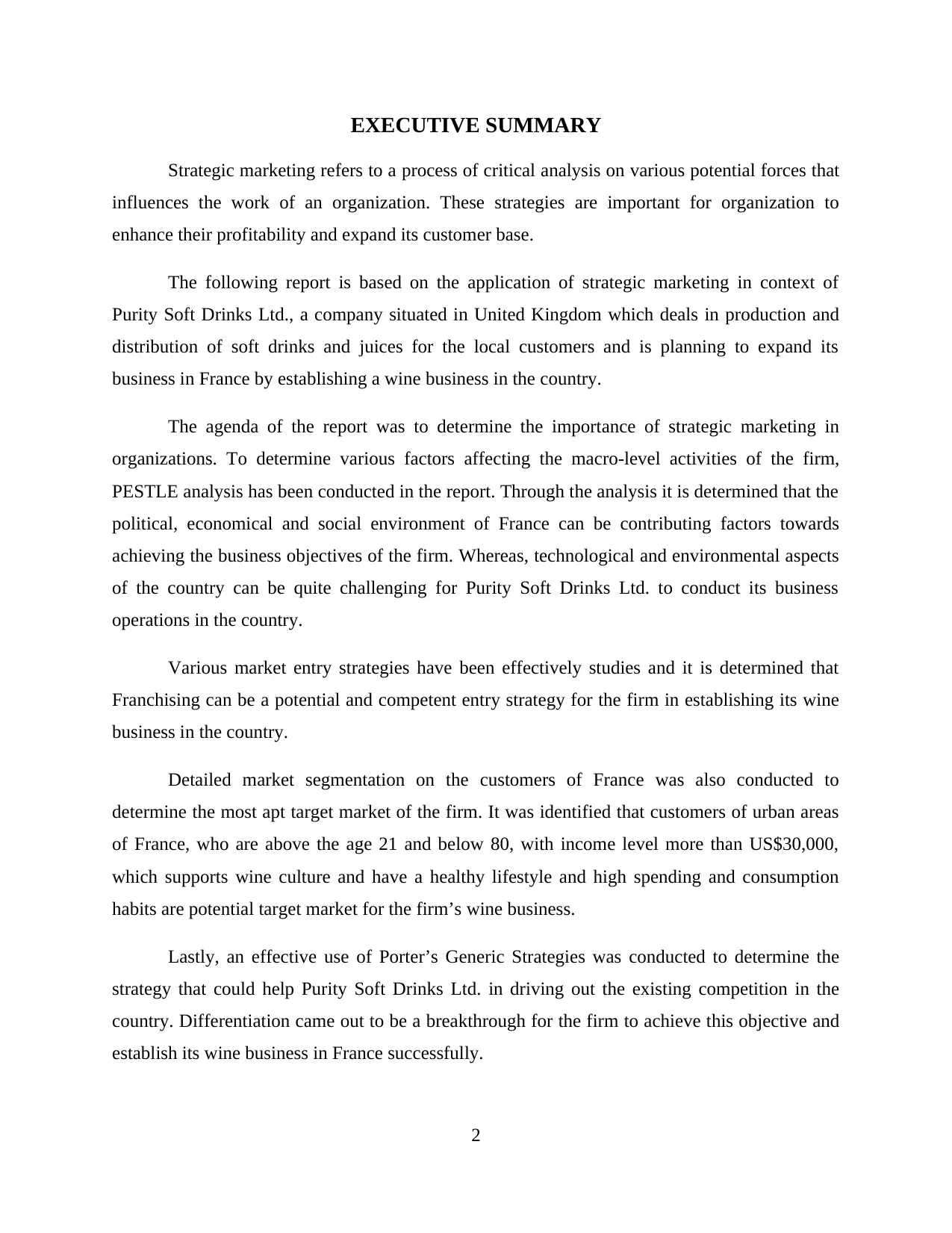
EXECUTIVE SUMMARY
Strategic marketing refers to a process of critical analysis on various potential forces that
influences the work of an organization. These strategies are important for organization to
enhance their profitability and expand its customer base.
The following report is based on the application of strategic marketing in context of
Purity Soft Drinks Ltd., a company situated in United Kingdom which deals in production and
distribution of soft drinks and juices for the local customers and is planning to expand its
business in France by establishing a wine business in the country.
The agenda of the report was to determine the importance of strategic marketing in
organizations. To determine various factors affecting the macro-level activities of the firm,
PESTLE analysis has been conducted in the report. Through the analysis it is determined that the
political, economical and social environment of France can be contributing factors towards
achieving the business objectives of the firm. Whereas, technological and environmental aspects
of the country can be quite challenging for Purity Soft Drinks Ltd. to conduct its business
operations in the country.
Various market entry strategies have been effectively studies and it is determined that
Franchising can be a potential and competent entry strategy for the firm in establishing its wine
business in the country.
Detailed market segmentation on the customers of France was also conducted to
determine the most apt target market of the firm. It was identified that customers of urban areas
of France, who are above the age 21 and below 80, with income level more than US$30,000,
which supports wine culture and have a healthy lifestyle and high spending and consumption
habits are potential target market for the firm’s wine business.
Lastly, an effective use of Porter’s Generic Strategies was conducted to determine the
strategy that could help Purity Soft Drinks Ltd. in driving out the existing competition in the
country. Differentiation came out to be a breakthrough for the firm to achieve this objective and
establish its wine business in France successfully.
2
Strategic marketing refers to a process of critical analysis on various potential forces that
influences the work of an organization. These strategies are important for organization to
enhance their profitability and expand its customer base.
The following report is based on the application of strategic marketing in context of
Purity Soft Drinks Ltd., a company situated in United Kingdom which deals in production and
distribution of soft drinks and juices for the local customers and is planning to expand its
business in France by establishing a wine business in the country.
The agenda of the report was to determine the importance of strategic marketing in
organizations. To determine various factors affecting the macro-level activities of the firm,
PESTLE analysis has been conducted in the report. Through the analysis it is determined that the
political, economical and social environment of France can be contributing factors towards
achieving the business objectives of the firm. Whereas, technological and environmental aspects
of the country can be quite challenging for Purity Soft Drinks Ltd. to conduct its business
operations in the country.
Various market entry strategies have been effectively studies and it is determined that
Franchising can be a potential and competent entry strategy for the firm in establishing its wine
business in the country.
Detailed market segmentation on the customers of France was also conducted to
determine the most apt target market of the firm. It was identified that customers of urban areas
of France, who are above the age 21 and below 80, with income level more than US$30,000,
which supports wine culture and have a healthy lifestyle and high spending and consumption
habits are potential target market for the firm’s wine business.
Lastly, an effective use of Porter’s Generic Strategies was conducted to determine the
strategy that could help Purity Soft Drinks Ltd. in driving out the existing competition in the
country. Differentiation came out to be a breakthrough for the firm to achieve this objective and
establish its wine business in France successfully.
2
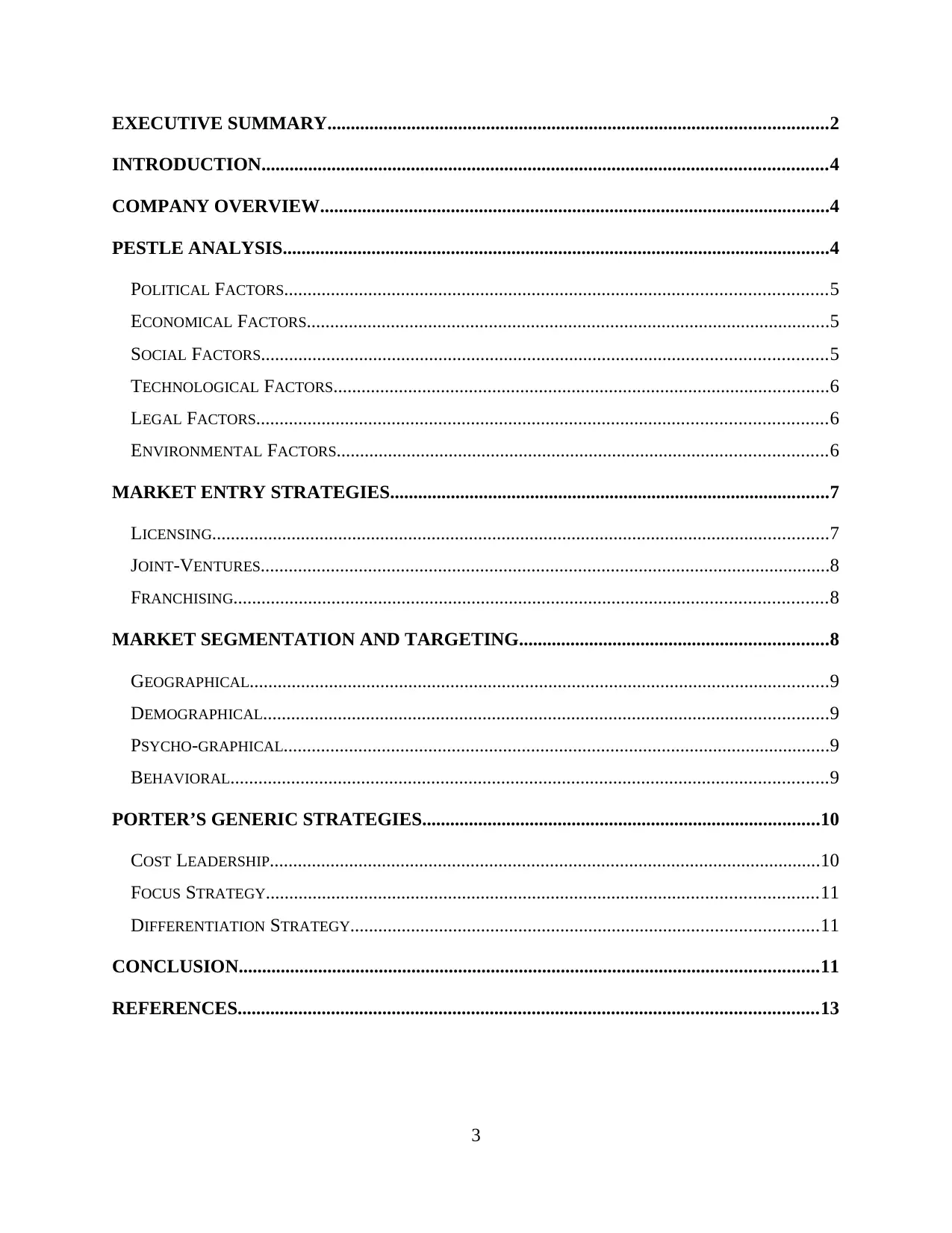
EXECUTIVE SUMMARY...........................................................................................................2
INTRODUCTION.........................................................................................................................4
COMPANY OVERVIEW.............................................................................................................4
PESTLE ANALYSIS.....................................................................................................................4
POLITICAL FACTORS....................................................................................................................5
ECONOMICAL FACTORS................................................................................................................5
SOCIAL FACTORS.........................................................................................................................5
TECHNOLOGICAL FACTORS..........................................................................................................6
LEGAL FACTORS..........................................................................................................................6
ENVIRONMENTAL FACTORS.........................................................................................................6
MARKET ENTRY STRATEGIES..............................................................................................7
LICENSING....................................................................................................................................7
JOINT-VENTURES..........................................................................................................................8
FRANCHISING...............................................................................................................................8
MARKET SEGMENTATION AND TARGETING..................................................................8
GEOGRAPHICAL............................................................................................................................9
DEMOGRAPHICAL.........................................................................................................................9
PSYCHO-GRAPHICAL.....................................................................................................................9
BEHAVIORAL................................................................................................................................9
PORTER’S GENERIC STRATEGIES.....................................................................................10
COST LEADERSHIP......................................................................................................................10
FOCUS STRATEGY......................................................................................................................11
DIFFERENTIATION STRATEGY....................................................................................................11
CONCLUSION............................................................................................................................11
REFERENCES............................................................................................................................13
3
INTRODUCTION.........................................................................................................................4
COMPANY OVERVIEW.............................................................................................................4
PESTLE ANALYSIS.....................................................................................................................4
POLITICAL FACTORS....................................................................................................................5
ECONOMICAL FACTORS................................................................................................................5
SOCIAL FACTORS.........................................................................................................................5
TECHNOLOGICAL FACTORS..........................................................................................................6
LEGAL FACTORS..........................................................................................................................6
ENVIRONMENTAL FACTORS.........................................................................................................6
MARKET ENTRY STRATEGIES..............................................................................................7
LICENSING....................................................................................................................................7
JOINT-VENTURES..........................................................................................................................8
FRANCHISING...............................................................................................................................8
MARKET SEGMENTATION AND TARGETING..................................................................8
GEOGRAPHICAL............................................................................................................................9
DEMOGRAPHICAL.........................................................................................................................9
PSYCHO-GRAPHICAL.....................................................................................................................9
BEHAVIORAL................................................................................................................................9
PORTER’S GENERIC STRATEGIES.....................................................................................10
COST LEADERSHIP......................................................................................................................10
FOCUS STRATEGY......................................................................................................................11
DIFFERENTIATION STRATEGY....................................................................................................11
CONCLUSION............................................................................................................................11
REFERENCES............................................................................................................................13
3
⊘ This is a preview!⊘
Do you want full access?
Subscribe today to unlock all pages.

Trusted by 1+ million students worldwide
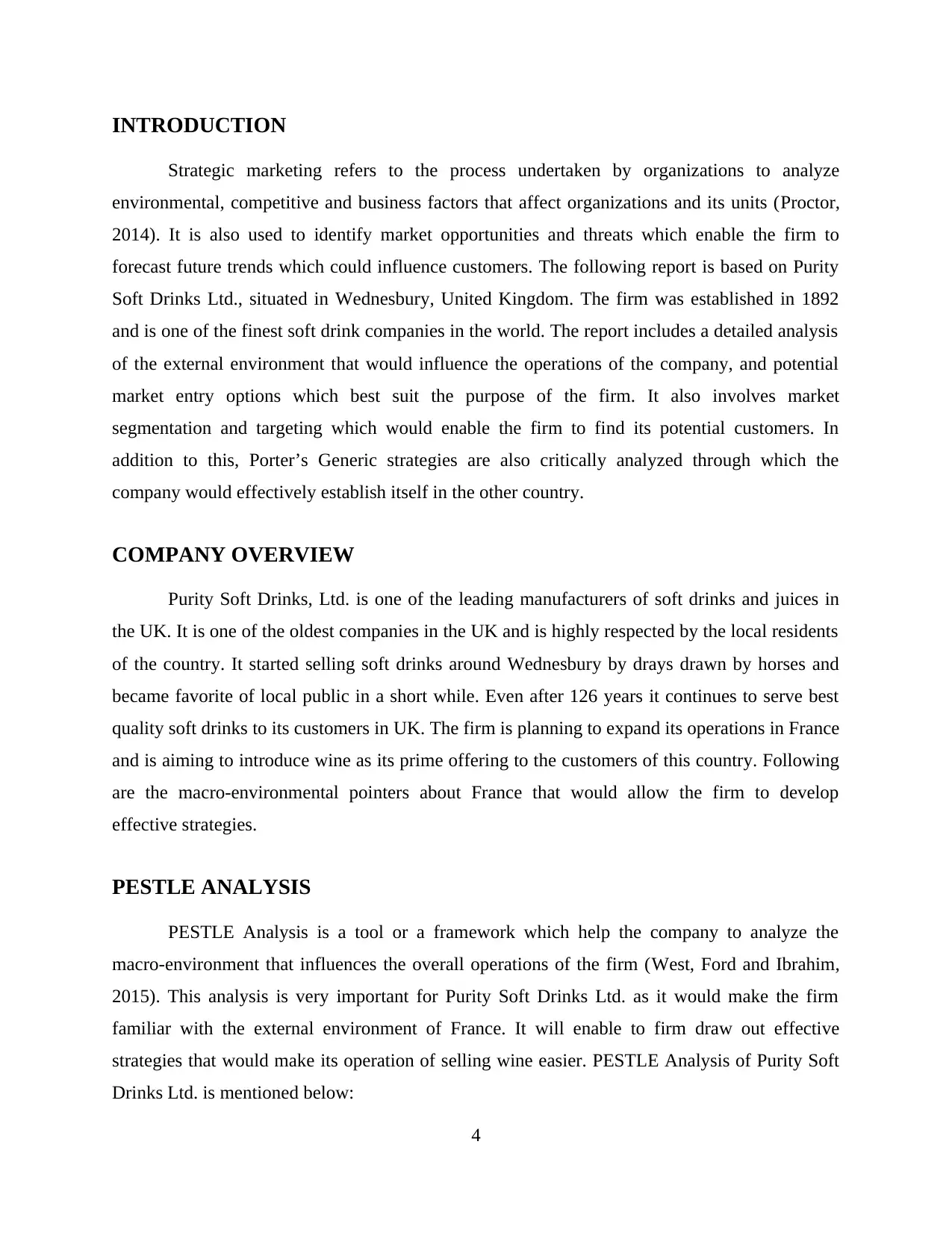
INTRODUCTION
Strategic marketing refers to the process undertaken by organizations to analyze
environmental, competitive and business factors that affect organizations and its units (Proctor,
2014). It is also used to identify market opportunities and threats which enable the firm to
forecast future trends which could influence customers. The following report is based on Purity
Soft Drinks Ltd., situated in Wednesbury, United Kingdom. The firm was established in 1892
and is one of the finest soft drink companies in the world. The report includes a detailed analysis
of the external environment that would influence the operations of the company, and potential
market entry options which best suit the purpose of the firm. It also involves market
segmentation and targeting which would enable the firm to find its potential customers. In
addition to this, Porter’s Generic strategies are also critically analyzed through which the
company would effectively establish itself in the other country.
COMPANY OVERVIEW
Purity Soft Drinks, Ltd. is one of the leading manufacturers of soft drinks and juices in
the UK. It is one of the oldest companies in the UK and is highly respected by the local residents
of the country. It started selling soft drinks around Wednesbury by drays drawn by horses and
became favorite of local public in a short while. Even after 126 years it continues to serve best
quality soft drinks to its customers in UK. The firm is planning to expand its operations in France
and is aiming to introduce wine as its prime offering to the customers of this country. Following
are the macro-environmental pointers about France that would allow the firm to develop
effective strategies.
PESTLE ANALYSIS
PESTLE Analysis is a tool or a framework which help the company to analyze the
macro-environment that influences the overall operations of the firm (West, Ford and Ibrahim,
2015). This analysis is very important for Purity Soft Drinks Ltd. as it would make the firm
familiar with the external environment of France. It will enable to firm draw out effective
strategies that would make its operation of selling wine easier. PESTLE Analysis of Purity Soft
Drinks Ltd. is mentioned below:
4
Strategic marketing refers to the process undertaken by organizations to analyze
environmental, competitive and business factors that affect organizations and its units (Proctor,
2014). It is also used to identify market opportunities and threats which enable the firm to
forecast future trends which could influence customers. The following report is based on Purity
Soft Drinks Ltd., situated in Wednesbury, United Kingdom. The firm was established in 1892
and is one of the finest soft drink companies in the world. The report includes a detailed analysis
of the external environment that would influence the operations of the company, and potential
market entry options which best suit the purpose of the firm. It also involves market
segmentation and targeting which would enable the firm to find its potential customers. In
addition to this, Porter’s Generic strategies are also critically analyzed through which the
company would effectively establish itself in the other country.
COMPANY OVERVIEW
Purity Soft Drinks, Ltd. is one of the leading manufacturers of soft drinks and juices in
the UK. It is one of the oldest companies in the UK and is highly respected by the local residents
of the country. It started selling soft drinks around Wednesbury by drays drawn by horses and
became favorite of local public in a short while. Even after 126 years it continues to serve best
quality soft drinks to its customers in UK. The firm is planning to expand its operations in France
and is aiming to introduce wine as its prime offering to the customers of this country. Following
are the macro-environmental pointers about France that would allow the firm to develop
effective strategies.
PESTLE ANALYSIS
PESTLE Analysis is a tool or a framework which help the company to analyze the
macro-environment that influences the overall operations of the firm (West, Ford and Ibrahim,
2015). This analysis is very important for Purity Soft Drinks Ltd. as it would make the firm
familiar with the external environment of France. It will enable to firm draw out effective
strategies that would make its operation of selling wine easier. PESTLE Analysis of Purity Soft
Drinks Ltd. is mentioned below:
4
Paraphrase This Document
Need a fresh take? Get an instant paraphrase of this document with our AI Paraphraser
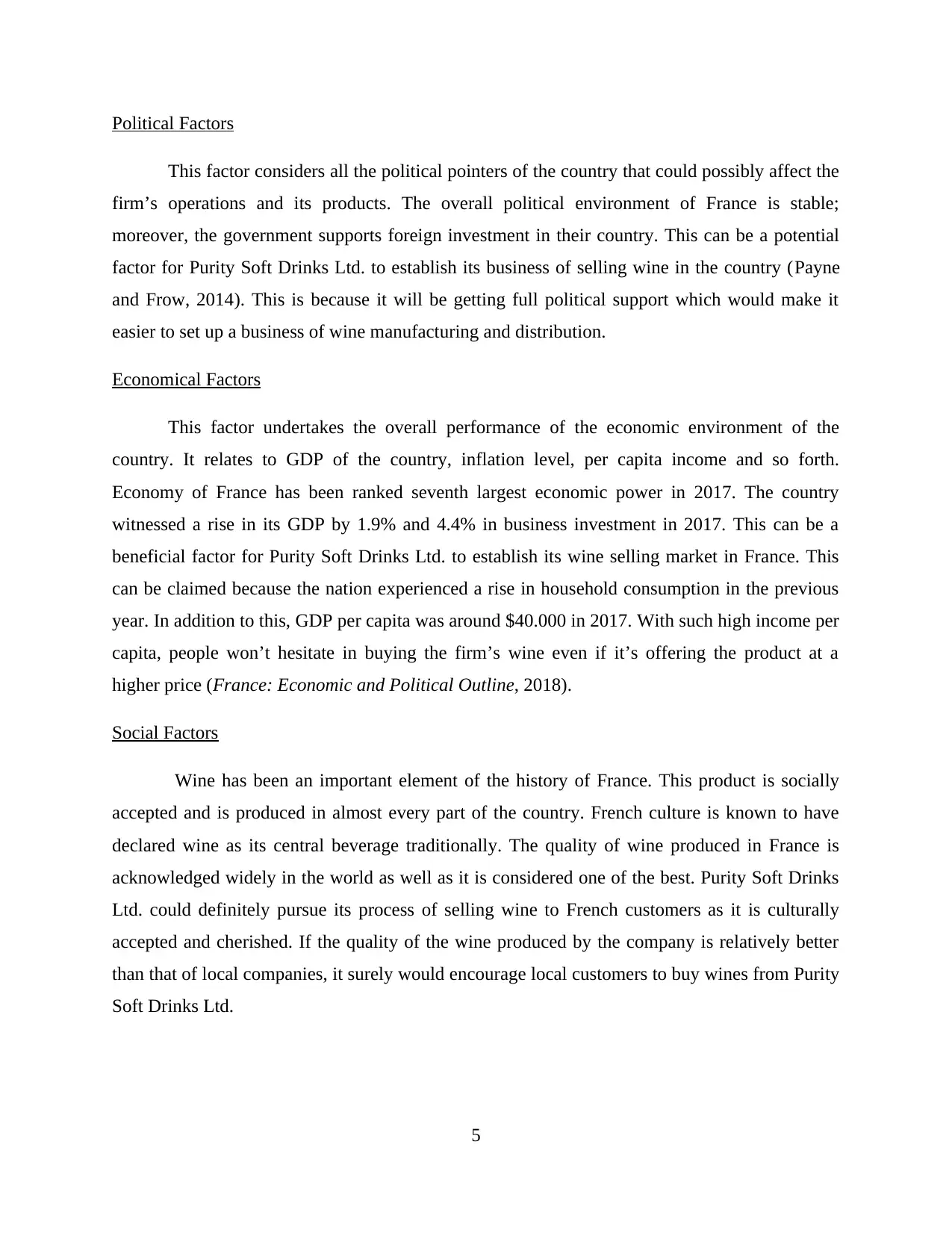
Political Factors
This factor considers all the political pointers of the country that could possibly affect the
firm’s operations and its products. The overall political environment of France is stable;
moreover, the government supports foreign investment in their country. This can be a potential
factor for Purity Soft Drinks Ltd. to establish its business of selling wine in the country (Payne
and Frow, 2014). This is because it will be getting full political support which would make it
easier to set up a business of wine manufacturing and distribution.
Economical Factors
This factor undertakes the overall performance of the economic environment of the
country. It relates to GDP of the country, inflation level, per capita income and so forth.
Economy of France has been ranked seventh largest economic power in 2017. The country
witnessed a rise in its GDP by 1.9% and 4.4% in business investment in 2017. This can be a
beneficial factor for Purity Soft Drinks Ltd. to establish its wine selling market in France. This
can be claimed because the nation experienced a rise in household consumption in the previous
year. In addition to this, GDP per capita was around $40.000 in 2017. With such high income per
capita, people won’t hesitate in buying the firm’s wine even if it’s offering the product at a
higher price (France: Economic and Political Outline, 2018).
Social Factors
Wine has been an important element of the history of France. This product is socially
accepted and is produced in almost every part of the country. French culture is known to have
declared wine as its central beverage traditionally. The quality of wine produced in France is
acknowledged widely in the world as well as it is considered one of the best. Purity Soft Drinks
Ltd. could definitely pursue its process of selling wine to French customers as it is culturally
accepted and cherished. If the quality of the wine produced by the company is relatively better
than that of local companies, it surely would encourage local customers to buy wines from Purity
Soft Drinks Ltd.
5
This factor considers all the political pointers of the country that could possibly affect the
firm’s operations and its products. The overall political environment of France is stable;
moreover, the government supports foreign investment in their country. This can be a potential
factor for Purity Soft Drinks Ltd. to establish its business of selling wine in the country (Payne
and Frow, 2014). This is because it will be getting full political support which would make it
easier to set up a business of wine manufacturing and distribution.
Economical Factors
This factor undertakes the overall performance of the economic environment of the
country. It relates to GDP of the country, inflation level, per capita income and so forth.
Economy of France has been ranked seventh largest economic power in 2017. The country
witnessed a rise in its GDP by 1.9% and 4.4% in business investment in 2017. This can be a
beneficial factor for Purity Soft Drinks Ltd. to establish its wine selling market in France. This
can be claimed because the nation experienced a rise in household consumption in the previous
year. In addition to this, GDP per capita was around $40.000 in 2017. With such high income per
capita, people won’t hesitate in buying the firm’s wine even if it’s offering the product at a
higher price (France: Economic and Political Outline, 2018).
Social Factors
Wine has been an important element of the history of France. This product is socially
accepted and is produced in almost every part of the country. French culture is known to have
declared wine as its central beverage traditionally. The quality of wine produced in France is
acknowledged widely in the world as well as it is considered one of the best. Purity Soft Drinks
Ltd. could definitely pursue its process of selling wine to French customers as it is culturally
accepted and cherished. If the quality of the wine produced by the company is relatively better
than that of local companies, it surely would encourage local customers to buy wines from Purity
Soft Drinks Ltd.
5
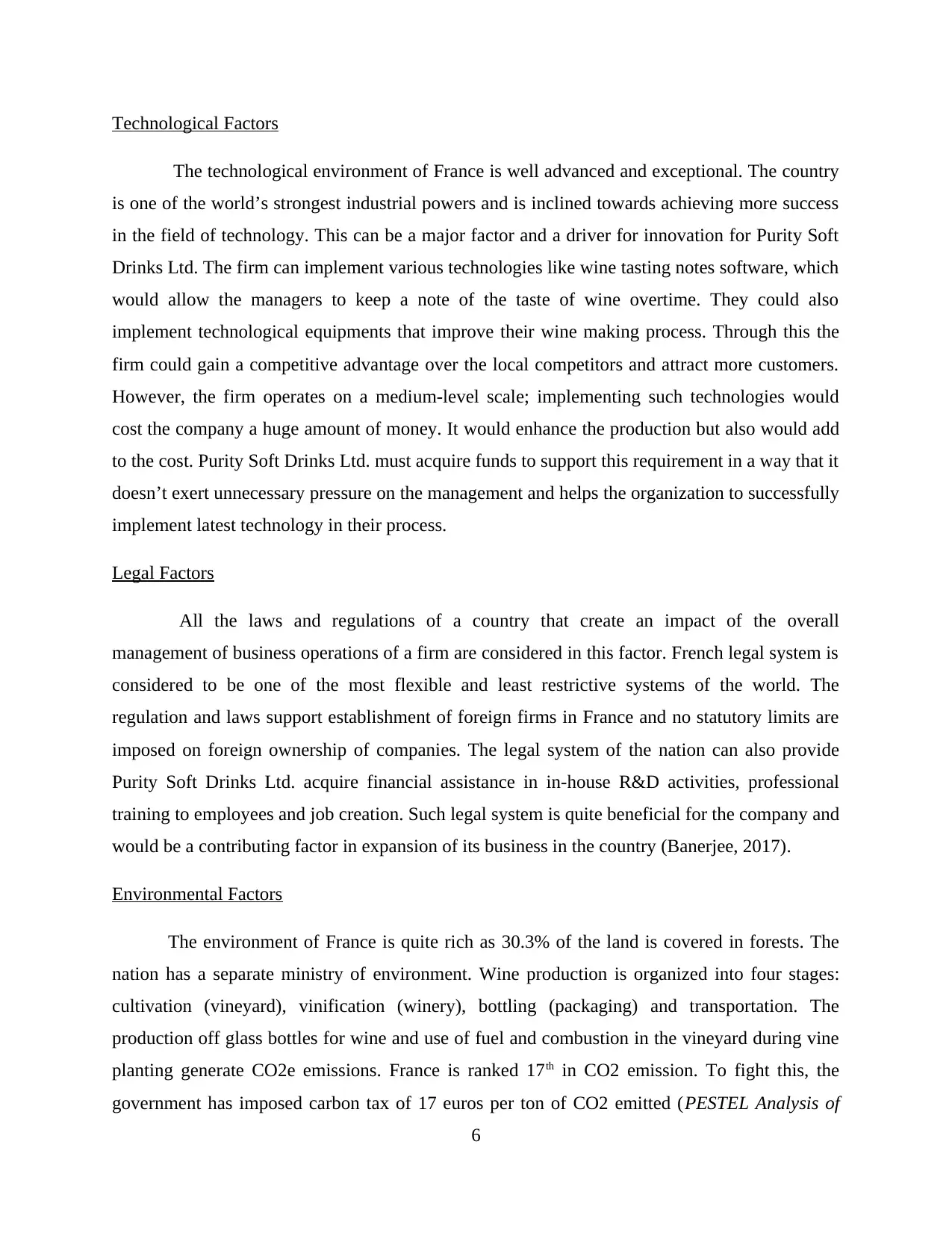
Technological Factors
The technological environment of France is well advanced and exceptional. The country
is one of the world’s strongest industrial powers and is inclined towards achieving more success
in the field of technology. This can be a major factor and a driver for innovation for Purity Soft
Drinks Ltd. The firm can implement various technologies like wine tasting notes software, which
would allow the managers to keep a note of the taste of wine overtime. They could also
implement technological equipments that improve their wine making process. Through this the
firm could gain a competitive advantage over the local competitors and attract more customers.
However, the firm operates on a medium-level scale; implementing such technologies would
cost the company a huge amount of money. It would enhance the production but also would add
to the cost. Purity Soft Drinks Ltd. must acquire funds to support this requirement in a way that it
doesn’t exert unnecessary pressure on the management and helps the organization to successfully
implement latest technology in their process.
Legal Factors
All the laws and regulations of a country that create an impact of the overall
management of business operations of a firm are considered in this factor. French legal system is
considered to be one of the most flexible and least restrictive systems of the world. The
regulation and laws support establishment of foreign firms in France and no statutory limits are
imposed on foreign ownership of companies. The legal system of the nation can also provide
Purity Soft Drinks Ltd. acquire financial assistance in in-house R&D activities, professional
training to employees and job creation. Such legal system is quite beneficial for the company and
would be a contributing factor in expansion of its business in the country (Banerjee, 2017).
Environmental Factors
The environment of France is quite rich as 30.3% of the land is covered in forests. The
nation has a separate ministry of environment. Wine production is organized into four stages:
cultivation (vineyard), vinification (winery), bottling (packaging) and transportation. The
production off glass bottles for wine and use of fuel and combustion in the vineyard during vine
planting generate CO2e emissions. France is ranked 17th in CO2 emission. To fight this, the
government has imposed carbon tax of 17 euros per ton of CO2 emitted (PESTEL Analysis of
6
The technological environment of France is well advanced and exceptional. The country
is one of the world’s strongest industrial powers and is inclined towards achieving more success
in the field of technology. This can be a major factor and a driver for innovation for Purity Soft
Drinks Ltd. The firm can implement various technologies like wine tasting notes software, which
would allow the managers to keep a note of the taste of wine overtime. They could also
implement technological equipments that improve their wine making process. Through this the
firm could gain a competitive advantage over the local competitors and attract more customers.
However, the firm operates on a medium-level scale; implementing such technologies would
cost the company a huge amount of money. It would enhance the production but also would add
to the cost. Purity Soft Drinks Ltd. must acquire funds to support this requirement in a way that it
doesn’t exert unnecessary pressure on the management and helps the organization to successfully
implement latest technology in their process.
Legal Factors
All the laws and regulations of a country that create an impact of the overall
management of business operations of a firm are considered in this factor. French legal system is
considered to be one of the most flexible and least restrictive systems of the world. The
regulation and laws support establishment of foreign firms in France and no statutory limits are
imposed on foreign ownership of companies. The legal system of the nation can also provide
Purity Soft Drinks Ltd. acquire financial assistance in in-house R&D activities, professional
training to employees and job creation. Such legal system is quite beneficial for the company and
would be a contributing factor in expansion of its business in the country (Banerjee, 2017).
Environmental Factors
The environment of France is quite rich as 30.3% of the land is covered in forests. The
nation has a separate ministry of environment. Wine production is organized into four stages:
cultivation (vineyard), vinification (winery), bottling (packaging) and transportation. The
production off glass bottles for wine and use of fuel and combustion in the vineyard during vine
planting generate CO2e emissions. France is ranked 17th in CO2 emission. To fight this, the
government has imposed carbon tax of 17 euros per ton of CO2 emitted (PESTEL Analysis of
6
⊘ This is a preview!⊘
Do you want full access?
Subscribe today to unlock all pages.

Trusted by 1+ million students worldwide
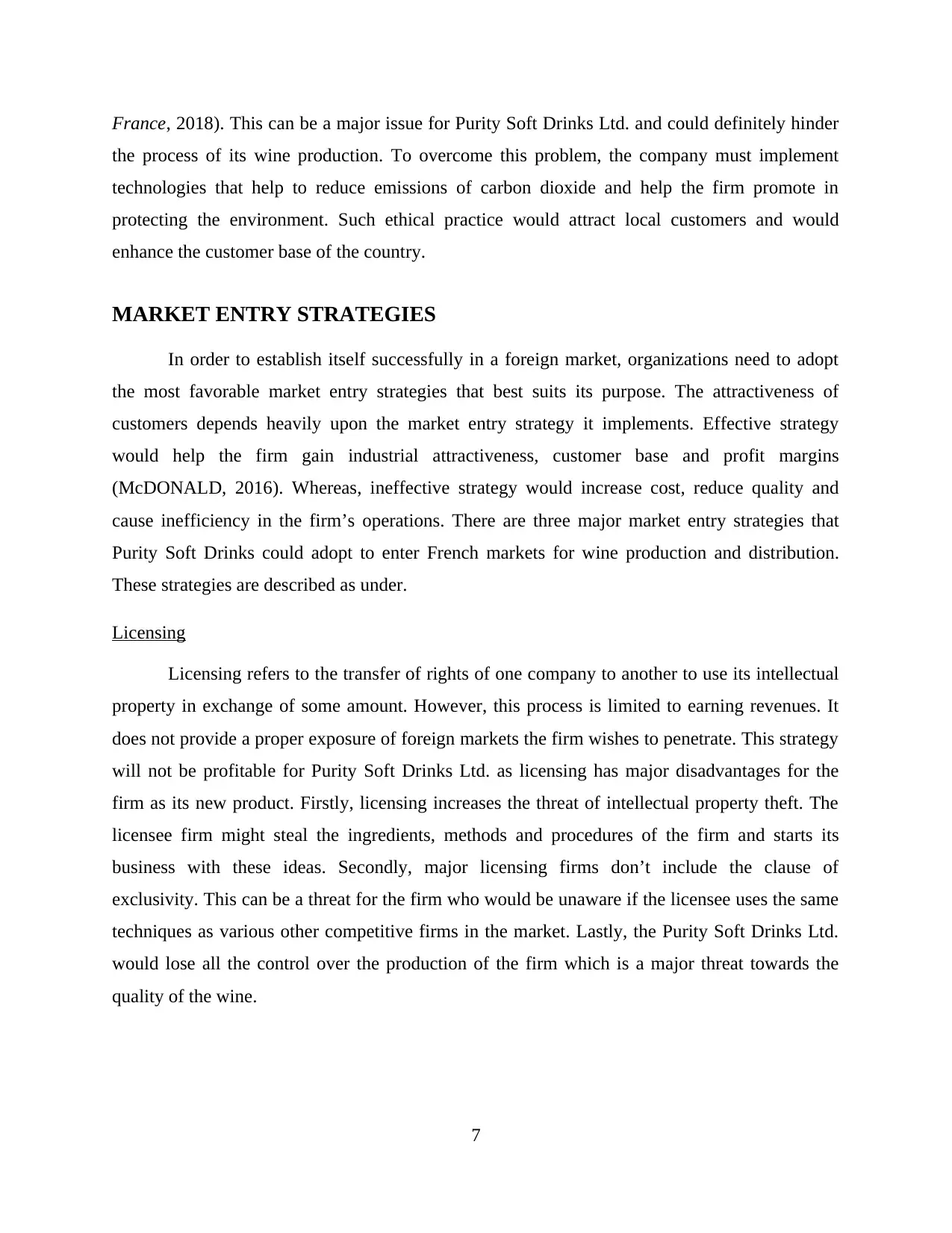
France, 2018). This can be a major issue for Purity Soft Drinks Ltd. and could definitely hinder
the process of its wine production. To overcome this problem, the company must implement
technologies that help to reduce emissions of carbon dioxide and help the firm promote in
protecting the environment. Such ethical practice would attract local customers and would
enhance the customer base of the country.
MARKET ENTRY STRATEGIES
In order to establish itself successfully in a foreign market, organizations need to adopt
the most favorable market entry strategies that best suits its purpose. The attractiveness of
customers depends heavily upon the market entry strategy it implements. Effective strategy
would help the firm gain industrial attractiveness, customer base and profit margins
(McDONALD, 2016). Whereas, ineffective strategy would increase cost, reduce quality and
cause inefficiency in the firm’s operations. There are three major market entry strategies that
Purity Soft Drinks could adopt to enter French markets for wine production and distribution.
These strategies are described as under.
Licensing
Licensing refers to the transfer of rights of one company to another to use its intellectual
property in exchange of some amount. However, this process is limited to earning revenues. It
does not provide a proper exposure of foreign markets the firm wishes to penetrate. This strategy
will not be profitable for Purity Soft Drinks Ltd. as licensing has major disadvantages for the
firm as its new product. Firstly, licensing increases the threat of intellectual property theft. The
licensee firm might steal the ingredients, methods and procedures of the firm and starts its
business with these ideas. Secondly, major licensing firms don’t include the clause of
exclusivity. This can be a threat for the firm who would be unaware if the licensee uses the same
techniques as various other competitive firms in the market. Lastly, the Purity Soft Drinks Ltd.
would lose all the control over the production of the firm which is a major threat towards the
quality of the wine.
7
the process of its wine production. To overcome this problem, the company must implement
technologies that help to reduce emissions of carbon dioxide and help the firm promote in
protecting the environment. Such ethical practice would attract local customers and would
enhance the customer base of the country.
MARKET ENTRY STRATEGIES
In order to establish itself successfully in a foreign market, organizations need to adopt
the most favorable market entry strategies that best suits its purpose. The attractiveness of
customers depends heavily upon the market entry strategy it implements. Effective strategy
would help the firm gain industrial attractiveness, customer base and profit margins
(McDONALD, 2016). Whereas, ineffective strategy would increase cost, reduce quality and
cause inefficiency in the firm’s operations. There are three major market entry strategies that
Purity Soft Drinks could adopt to enter French markets for wine production and distribution.
These strategies are described as under.
Licensing
Licensing refers to the transfer of rights of one company to another to use its intellectual
property in exchange of some amount. However, this process is limited to earning revenues. It
does not provide a proper exposure of foreign markets the firm wishes to penetrate. This strategy
will not be profitable for Purity Soft Drinks Ltd. as licensing has major disadvantages for the
firm as its new product. Firstly, licensing increases the threat of intellectual property theft. The
licensee firm might steal the ingredients, methods and procedures of the firm and starts its
business with these ideas. Secondly, major licensing firms don’t include the clause of
exclusivity. This can be a threat for the firm who would be unaware if the licensee uses the same
techniques as various other competitive firms in the market. Lastly, the Purity Soft Drinks Ltd.
would lose all the control over the production of the firm which is a major threat towards the
quality of the wine.
7
Paraphrase This Document
Need a fresh take? Get an instant paraphrase of this document with our AI Paraphraser
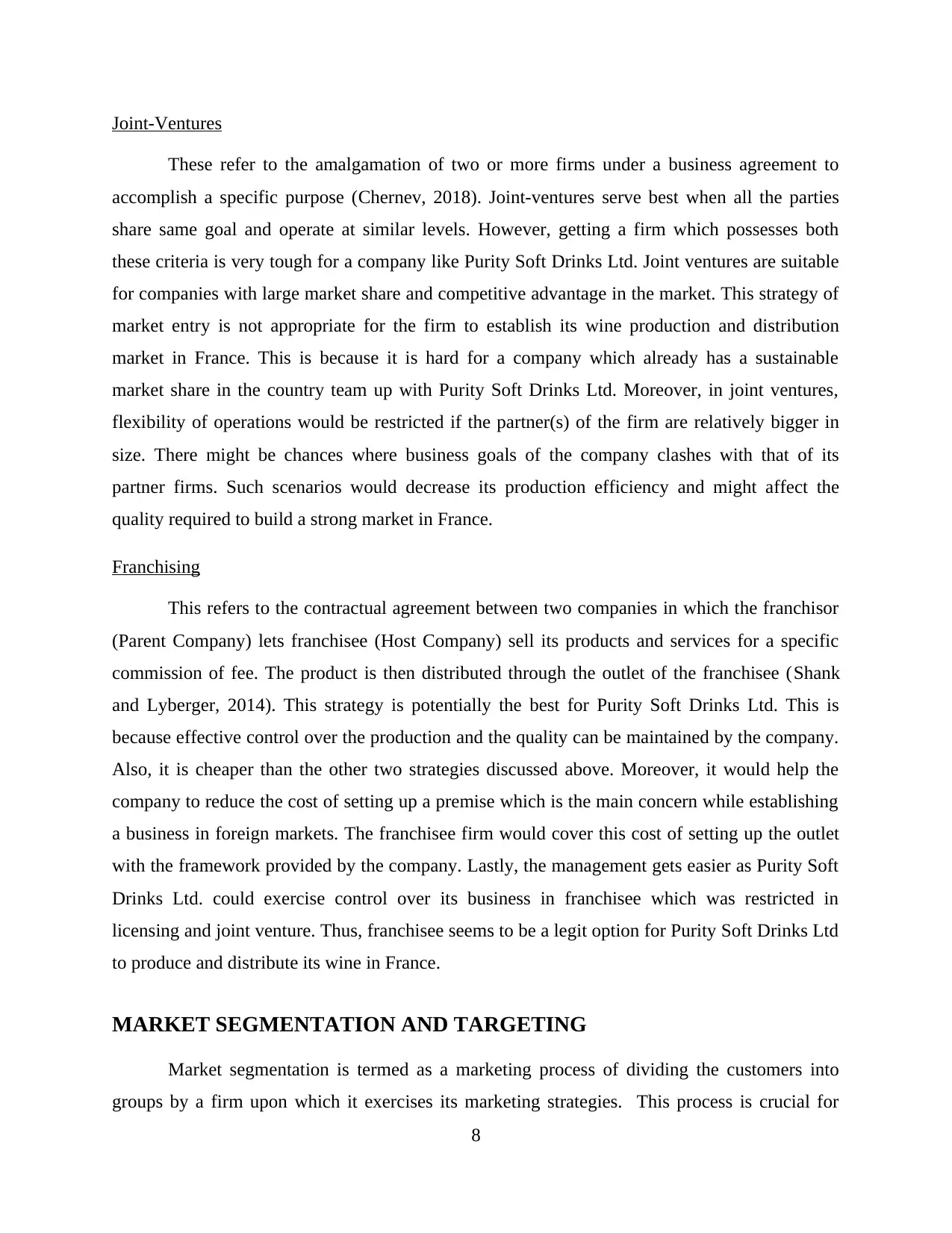
Joint-Ventures
These refer to the amalgamation of two or more firms under a business agreement to
accomplish a specific purpose (Chernev, 2018). Joint-ventures serve best when all the parties
share same goal and operate at similar levels. However, getting a firm which possesses both
these criteria is very tough for a company like Purity Soft Drinks Ltd. Joint ventures are suitable
for companies with large market share and competitive advantage in the market. This strategy of
market entry is not appropriate for the firm to establish its wine production and distribution
market in France. This is because it is hard for a company which already has a sustainable
market share in the country team up with Purity Soft Drinks Ltd. Moreover, in joint ventures,
flexibility of operations would be restricted if the partner(s) of the firm are relatively bigger in
size. There might be chances where business goals of the company clashes with that of its
partner firms. Such scenarios would decrease its production efficiency and might affect the
quality required to build a strong market in France.
Franchising
This refers to the contractual agreement between two companies in which the franchisor
(Parent Company) lets franchisee (Host Company) sell its products and services for a specific
commission of fee. The product is then distributed through the outlet of the franchisee (Shank
and Lyberger, 2014). This strategy is potentially the best for Purity Soft Drinks Ltd. This is
because effective control over the production and the quality can be maintained by the company.
Also, it is cheaper than the other two strategies discussed above. Moreover, it would help the
company to reduce the cost of setting up a premise which is the main concern while establishing
a business in foreign markets. The franchisee firm would cover this cost of setting up the outlet
with the framework provided by the company. Lastly, the management gets easier as Purity Soft
Drinks Ltd. could exercise control over its business in franchisee which was restricted in
licensing and joint venture. Thus, franchisee seems to be a legit option for Purity Soft Drinks Ltd
to produce and distribute its wine in France.
MARKET SEGMENTATION AND TARGETING
Market segmentation is termed as a marketing process of dividing the customers into
groups by a firm upon which it exercises its marketing strategies. This process is crucial for
8
These refer to the amalgamation of two or more firms under a business agreement to
accomplish a specific purpose (Chernev, 2018). Joint-ventures serve best when all the parties
share same goal and operate at similar levels. However, getting a firm which possesses both
these criteria is very tough for a company like Purity Soft Drinks Ltd. Joint ventures are suitable
for companies with large market share and competitive advantage in the market. This strategy of
market entry is not appropriate for the firm to establish its wine production and distribution
market in France. This is because it is hard for a company which already has a sustainable
market share in the country team up with Purity Soft Drinks Ltd. Moreover, in joint ventures,
flexibility of operations would be restricted if the partner(s) of the firm are relatively bigger in
size. There might be chances where business goals of the company clashes with that of its
partner firms. Such scenarios would decrease its production efficiency and might affect the
quality required to build a strong market in France.
Franchising
This refers to the contractual agreement between two companies in which the franchisor
(Parent Company) lets franchisee (Host Company) sell its products and services for a specific
commission of fee. The product is then distributed through the outlet of the franchisee (Shank
and Lyberger, 2014). This strategy is potentially the best for Purity Soft Drinks Ltd. This is
because effective control over the production and the quality can be maintained by the company.
Also, it is cheaper than the other two strategies discussed above. Moreover, it would help the
company to reduce the cost of setting up a premise which is the main concern while establishing
a business in foreign markets. The franchisee firm would cover this cost of setting up the outlet
with the framework provided by the company. Lastly, the management gets easier as Purity Soft
Drinks Ltd. could exercise control over its business in franchisee which was restricted in
licensing and joint venture. Thus, franchisee seems to be a legit option for Purity Soft Drinks Ltd
to produce and distribute its wine in France.
MARKET SEGMENTATION AND TARGETING
Market segmentation is termed as a marketing process of dividing the customers into
groups by a firm upon which it exercises its marketing strategies. This process is crucial for
8
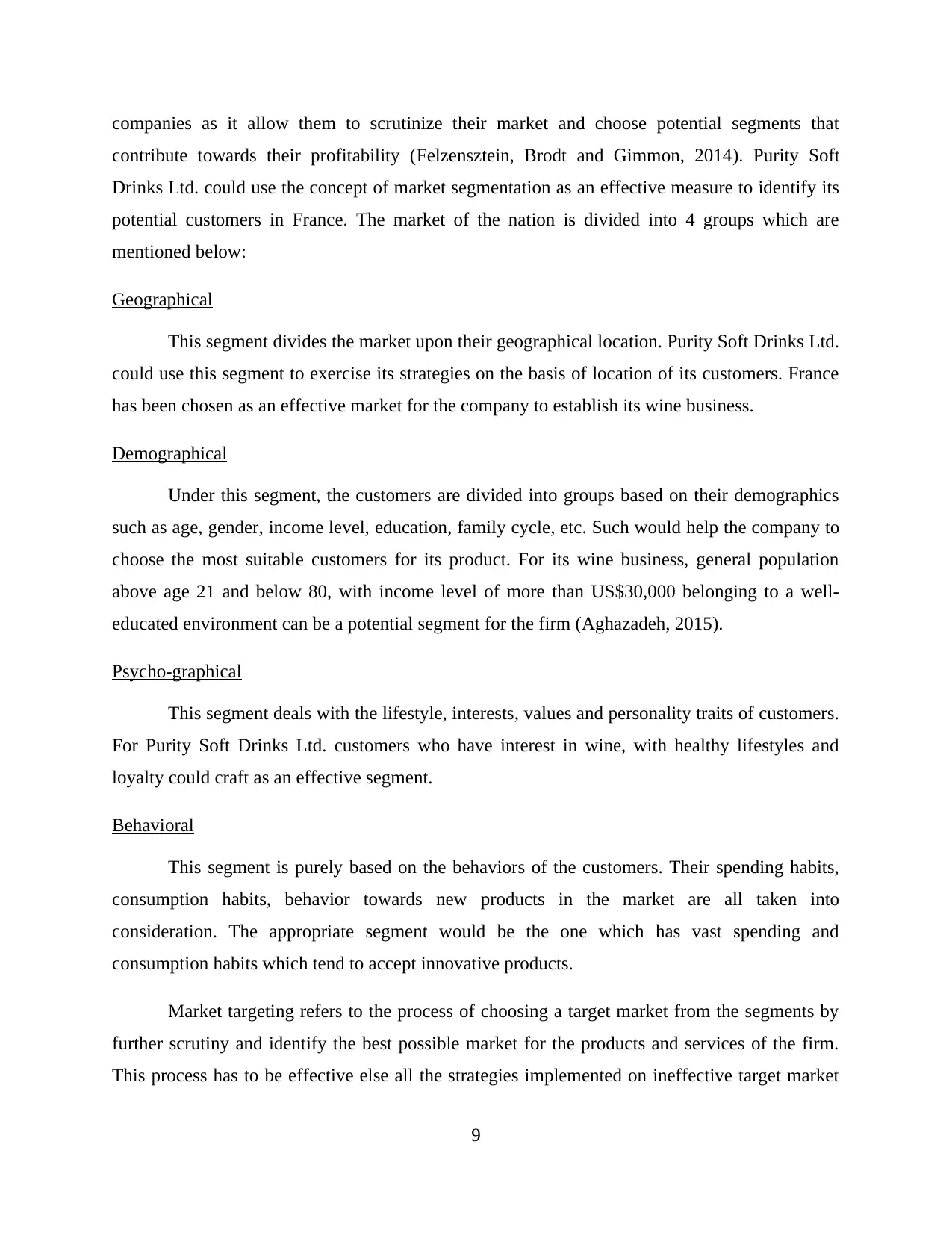
companies as it allow them to scrutinize their market and choose potential segments that
contribute towards their profitability (Felzensztein, Brodt and Gimmon, 2014). Purity Soft
Drinks Ltd. could use the concept of market segmentation as an effective measure to identify its
potential customers in France. The market of the nation is divided into 4 groups which are
mentioned below:
Geographical
This segment divides the market upon their geographical location. Purity Soft Drinks Ltd.
could use this segment to exercise its strategies on the basis of location of its customers. France
has been chosen as an effective market for the company to establish its wine business.
Demographical
Under this segment, the customers are divided into groups based on their demographics
such as age, gender, income level, education, family cycle, etc. Such would help the company to
choose the most suitable customers for its product. For its wine business, general population
above age 21 and below 80, with income level of more than US$30,000 belonging to a well-
educated environment can be a potential segment for the firm (Aghazadeh, 2015).
Psycho-graphical
This segment deals with the lifestyle, interests, values and personality traits of customers.
For Purity Soft Drinks Ltd. customers who have interest in wine, with healthy lifestyles and
loyalty could craft as an effective segment.
Behavioral
This segment is purely based on the behaviors of the customers. Their spending habits,
consumption habits, behavior towards new products in the market are all taken into
consideration. The appropriate segment would be the one which has vast spending and
consumption habits which tend to accept innovative products.
Market targeting refers to the process of choosing a target market from the segments by
further scrutiny and identify the best possible market for the products and services of the firm.
This process has to be effective else all the strategies implemented on ineffective target market
9
contribute towards their profitability (Felzensztein, Brodt and Gimmon, 2014). Purity Soft
Drinks Ltd. could use the concept of market segmentation as an effective measure to identify its
potential customers in France. The market of the nation is divided into 4 groups which are
mentioned below:
Geographical
This segment divides the market upon their geographical location. Purity Soft Drinks Ltd.
could use this segment to exercise its strategies on the basis of location of its customers. France
has been chosen as an effective market for the company to establish its wine business.
Demographical
Under this segment, the customers are divided into groups based on their demographics
such as age, gender, income level, education, family cycle, etc. Such would help the company to
choose the most suitable customers for its product. For its wine business, general population
above age 21 and below 80, with income level of more than US$30,000 belonging to a well-
educated environment can be a potential segment for the firm (Aghazadeh, 2015).
Psycho-graphical
This segment deals with the lifestyle, interests, values and personality traits of customers.
For Purity Soft Drinks Ltd. customers who have interest in wine, with healthy lifestyles and
loyalty could craft as an effective segment.
Behavioral
This segment is purely based on the behaviors of the customers. Their spending habits,
consumption habits, behavior towards new products in the market are all taken into
consideration. The appropriate segment would be the one which has vast spending and
consumption habits which tend to accept innovative products.
Market targeting refers to the process of choosing a target market from the segments by
further scrutiny and identify the best possible market for the products and services of the firm.
This process has to be effective else all the strategies implemented on ineffective target market
9
⊘ This is a preview!⊘
Do you want full access?
Subscribe today to unlock all pages.

Trusted by 1+ million students worldwide
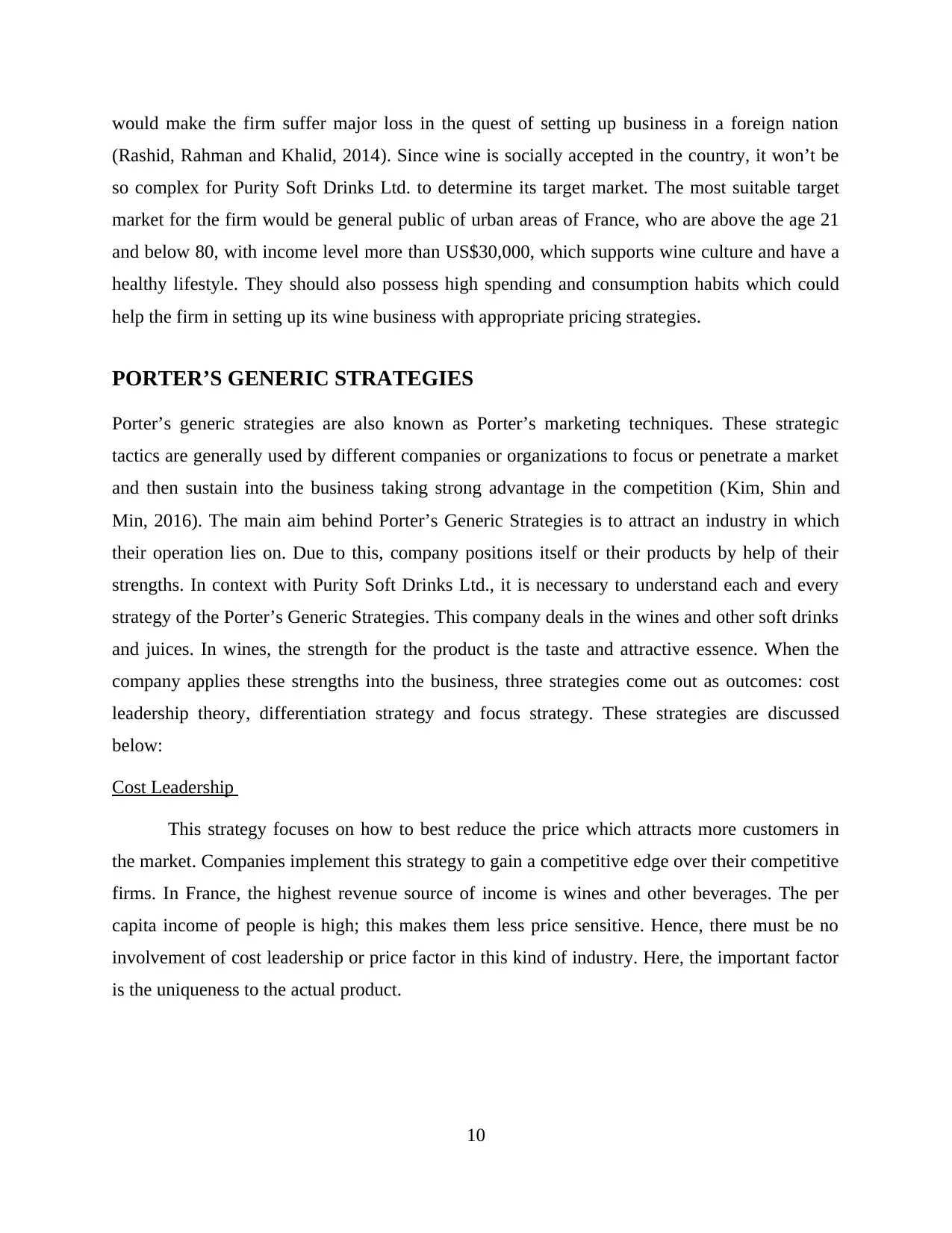
would make the firm suffer major loss in the quest of setting up business in a foreign nation
(Rashid, Rahman and Khalid, 2014). Since wine is socially accepted in the country, it won’t be
so complex for Purity Soft Drinks Ltd. to determine its target market. The most suitable target
market for the firm would be general public of urban areas of France, who are above the age 21
and below 80, with income level more than US$30,000, which supports wine culture and have a
healthy lifestyle. They should also possess high spending and consumption habits which could
help the firm in setting up its wine business with appropriate pricing strategies.
PORTER’S GENERIC STRATEGIES
Porter’s generic strategies are also known as Porter’s marketing techniques. These strategic
tactics are generally used by different companies or organizations to focus or penetrate a market
and then sustain into the business taking strong advantage in the competition (Kim, Shin and
Min, 2016). The main aim behind Porter’s Generic Strategies is to attract an industry in which
their operation lies on. Due to this, company positions itself or their products by help of their
strengths. In context with Purity Soft Drinks Ltd., it is necessary to understand each and every
strategy of the Porter’s Generic Strategies. This company deals in the wines and other soft drinks
and juices. In wines, the strength for the product is the taste and attractive essence. When the
company applies these strengths into the business, three strategies come out as outcomes: cost
leadership theory, differentiation strategy and focus strategy. These strategies are discussed
below:
Cost Leadership
This strategy focuses on how to best reduce the price which attracts more customers in
the market. Companies implement this strategy to gain a competitive edge over their competitive
firms. In France, the highest revenue source of income is wines and other beverages. The per
capita income of people is high; this makes them less price sensitive. Hence, there must be no
involvement of cost leadership or price factor in this kind of industry. Here, the important factor
is the uniqueness to the actual product.
10
(Rashid, Rahman and Khalid, 2014). Since wine is socially accepted in the country, it won’t be
so complex for Purity Soft Drinks Ltd. to determine its target market. The most suitable target
market for the firm would be general public of urban areas of France, who are above the age 21
and below 80, with income level more than US$30,000, which supports wine culture and have a
healthy lifestyle. They should also possess high spending and consumption habits which could
help the firm in setting up its wine business with appropriate pricing strategies.
PORTER’S GENERIC STRATEGIES
Porter’s generic strategies are also known as Porter’s marketing techniques. These strategic
tactics are generally used by different companies or organizations to focus or penetrate a market
and then sustain into the business taking strong advantage in the competition (Kim, Shin and
Min, 2016). The main aim behind Porter’s Generic Strategies is to attract an industry in which
their operation lies on. Due to this, company positions itself or their products by help of their
strengths. In context with Purity Soft Drinks Ltd., it is necessary to understand each and every
strategy of the Porter’s Generic Strategies. This company deals in the wines and other soft drinks
and juices. In wines, the strength for the product is the taste and attractive essence. When the
company applies these strengths into the business, three strategies come out as outcomes: cost
leadership theory, differentiation strategy and focus strategy. These strategies are discussed
below:
Cost Leadership
This strategy focuses on how to best reduce the price which attracts more customers in
the market. Companies implement this strategy to gain a competitive edge over their competitive
firms. In France, the highest revenue source of income is wines and other beverages. The per
capita income of people is high; this makes them less price sensitive. Hence, there must be no
involvement of cost leadership or price factor in this kind of industry. Here, the important factor
is the uniqueness to the actual product.
10
Paraphrase This Document
Need a fresh take? Get an instant paraphrase of this document with our AI Paraphraser
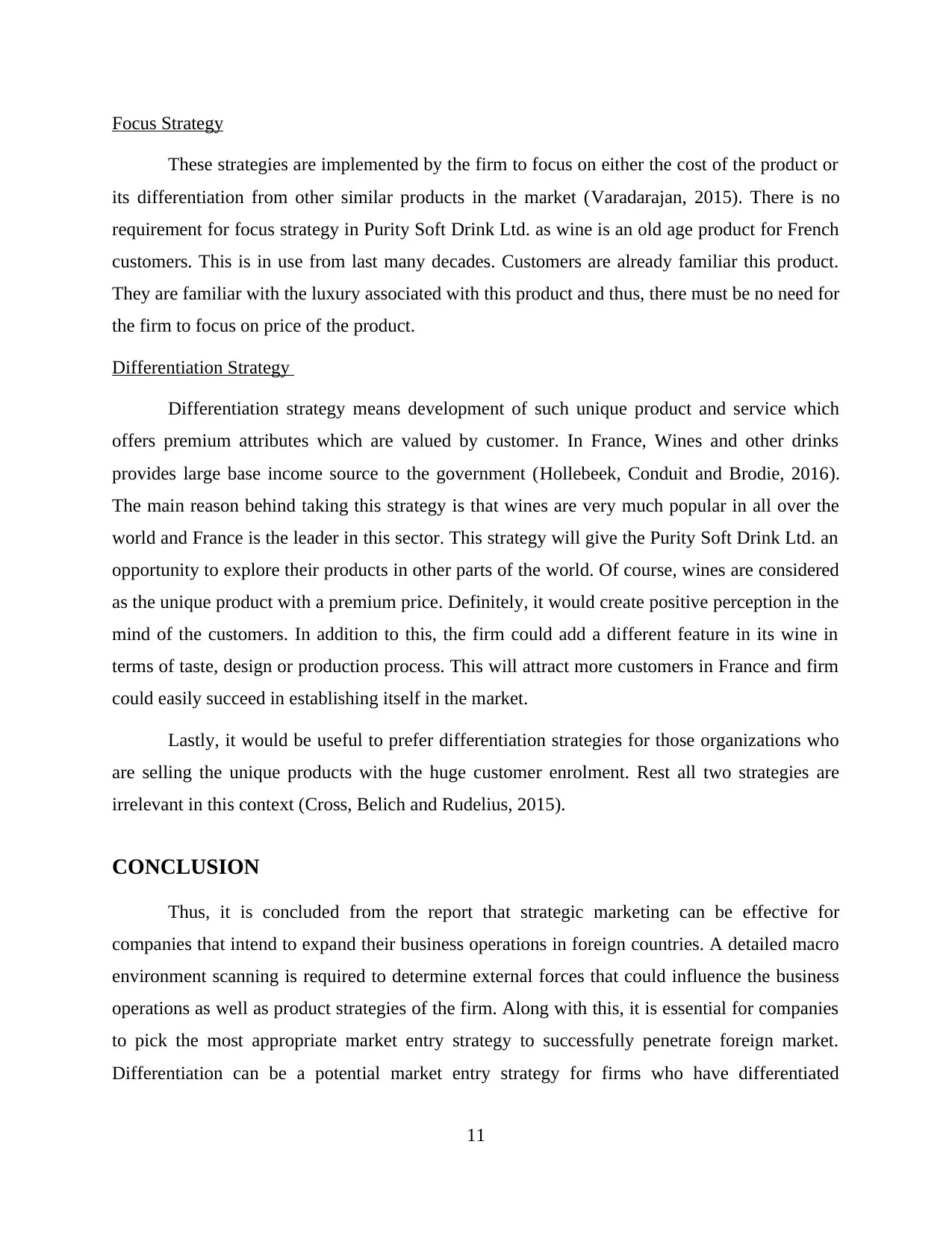
Focus Strategy
These strategies are implemented by the firm to focus on either the cost of the product or
its differentiation from other similar products in the market (Varadarajan, 2015). There is no
requirement for focus strategy in Purity Soft Drink Ltd. as wine is an old age product for French
customers. This is in use from last many decades. Customers are already familiar this product.
They are familiar with the luxury associated with this product and thus, there must be no need for
the firm to focus on price of the product.
Differentiation Strategy
Differentiation strategy means development of such unique product and service which
offers premium attributes which are valued by customer. In France, Wines and other drinks
provides large base income source to the government (Hollebeek, Conduit and Brodie, 2016).
The main reason behind taking this strategy is that wines are very much popular in all over the
world and France is the leader in this sector. This strategy will give the Purity Soft Drink Ltd. an
opportunity to explore their products in other parts of the world. Of course, wines are considered
as the unique product with a premium price. Definitely, it would create positive perception in the
mind of the customers. In addition to this, the firm could add a different feature in its wine in
terms of taste, design or production process. This will attract more customers in France and firm
could easily succeed in establishing itself in the market.
Lastly, it would be useful to prefer differentiation strategies for those organizations who
are selling the unique products with the huge customer enrolment. Rest all two strategies are
irrelevant in this context (Cross, Belich and Rudelius, 2015).
CONCLUSION
Thus, it is concluded from the report that strategic marketing can be effective for
companies that intend to expand their business operations in foreign countries. A detailed macro
environment scanning is required to determine external forces that could influence the business
operations as well as product strategies of the firm. Along with this, it is essential for companies
to pick the most appropriate market entry strategy to successfully penetrate foreign market.
Differentiation can be a potential market entry strategy for firms who have differentiated
11
These strategies are implemented by the firm to focus on either the cost of the product or
its differentiation from other similar products in the market (Varadarajan, 2015). There is no
requirement for focus strategy in Purity Soft Drink Ltd. as wine is an old age product for French
customers. This is in use from last many decades. Customers are already familiar this product.
They are familiar with the luxury associated with this product and thus, there must be no need for
the firm to focus on price of the product.
Differentiation Strategy
Differentiation strategy means development of such unique product and service which
offers premium attributes which are valued by customer. In France, Wines and other drinks
provides large base income source to the government (Hollebeek, Conduit and Brodie, 2016).
The main reason behind taking this strategy is that wines are very much popular in all over the
world and France is the leader in this sector. This strategy will give the Purity Soft Drink Ltd. an
opportunity to explore their products in other parts of the world. Of course, wines are considered
as the unique product with a premium price. Definitely, it would create positive perception in the
mind of the customers. In addition to this, the firm could add a different feature in its wine in
terms of taste, design or production process. This will attract more customers in France and firm
could easily succeed in establishing itself in the market.
Lastly, it would be useful to prefer differentiation strategies for those organizations who
are selling the unique products with the huge customer enrolment. Rest all two strategies are
irrelevant in this context (Cross, Belich and Rudelius, 2015).
CONCLUSION
Thus, it is concluded from the report that strategic marketing can be effective for
companies that intend to expand their business operations in foreign countries. A detailed macro
environment scanning is required to determine external forces that could influence the business
operations as well as product strategies of the firm. Along with this, it is essential for companies
to pick the most appropriate market entry strategy to successfully penetrate foreign market.
Differentiation can be a potential market entry strategy for firms who have differentiated
11
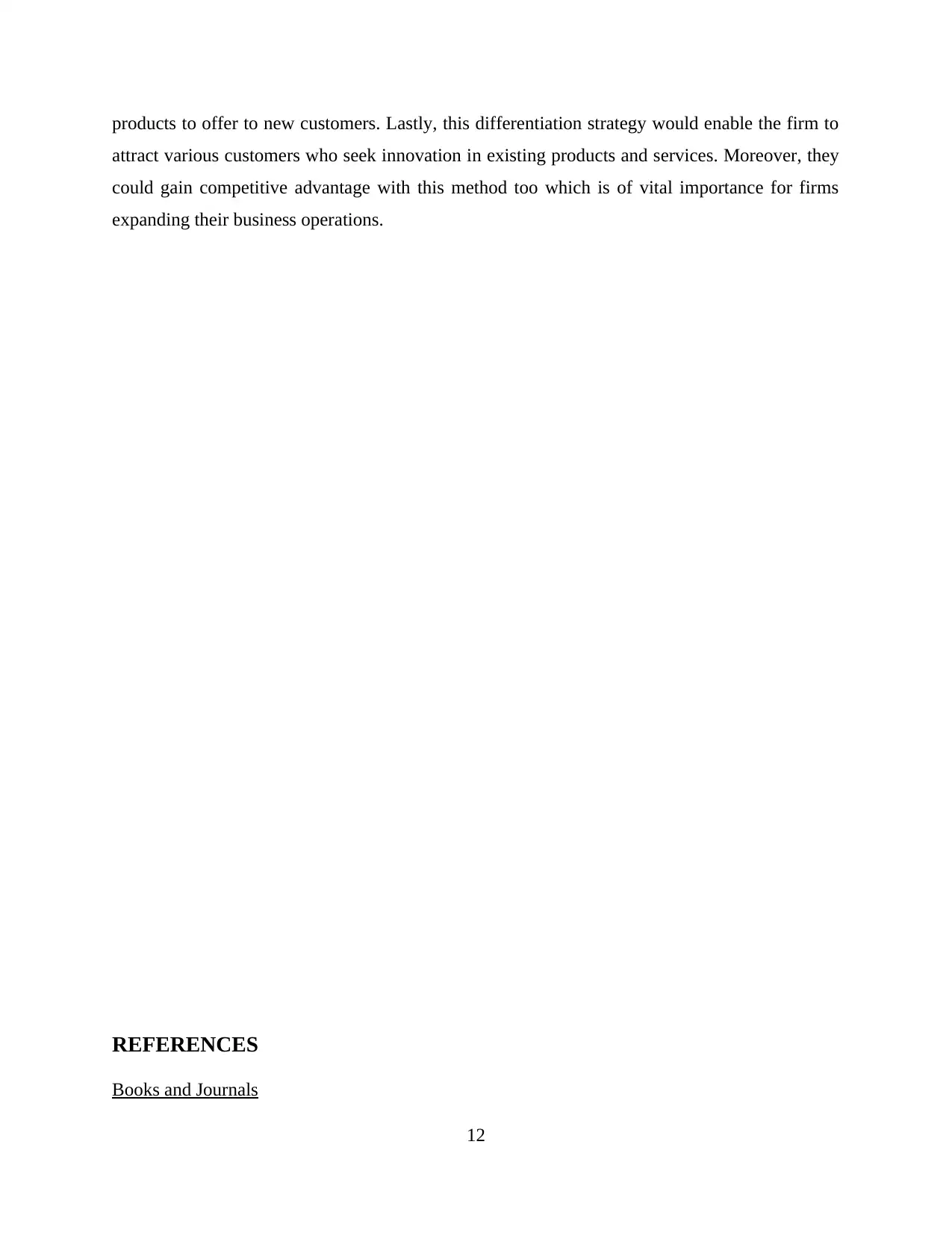
products to offer to new customers. Lastly, this differentiation strategy would enable the firm to
attract various customers who seek innovation in existing products and services. Moreover, they
could gain competitive advantage with this method too which is of vital importance for firms
expanding their business operations.
REFERENCES
Books and Journals
12
attract various customers who seek innovation in existing products and services. Moreover, they
could gain competitive advantage with this method too which is of vital importance for firms
expanding their business operations.
REFERENCES
Books and Journals
12
⊘ This is a preview!⊘
Do you want full access?
Subscribe today to unlock all pages.

Trusted by 1+ million students worldwide
1 out of 14
Related Documents
Your All-in-One AI-Powered Toolkit for Academic Success.
+13062052269
info@desklib.com
Available 24*7 on WhatsApp / Email
![[object Object]](/_next/static/media/star-bottom.7253800d.svg)
Unlock your academic potential
Copyright © 2020–2026 A2Z Services. All Rights Reserved. Developed and managed by ZUCOL.





